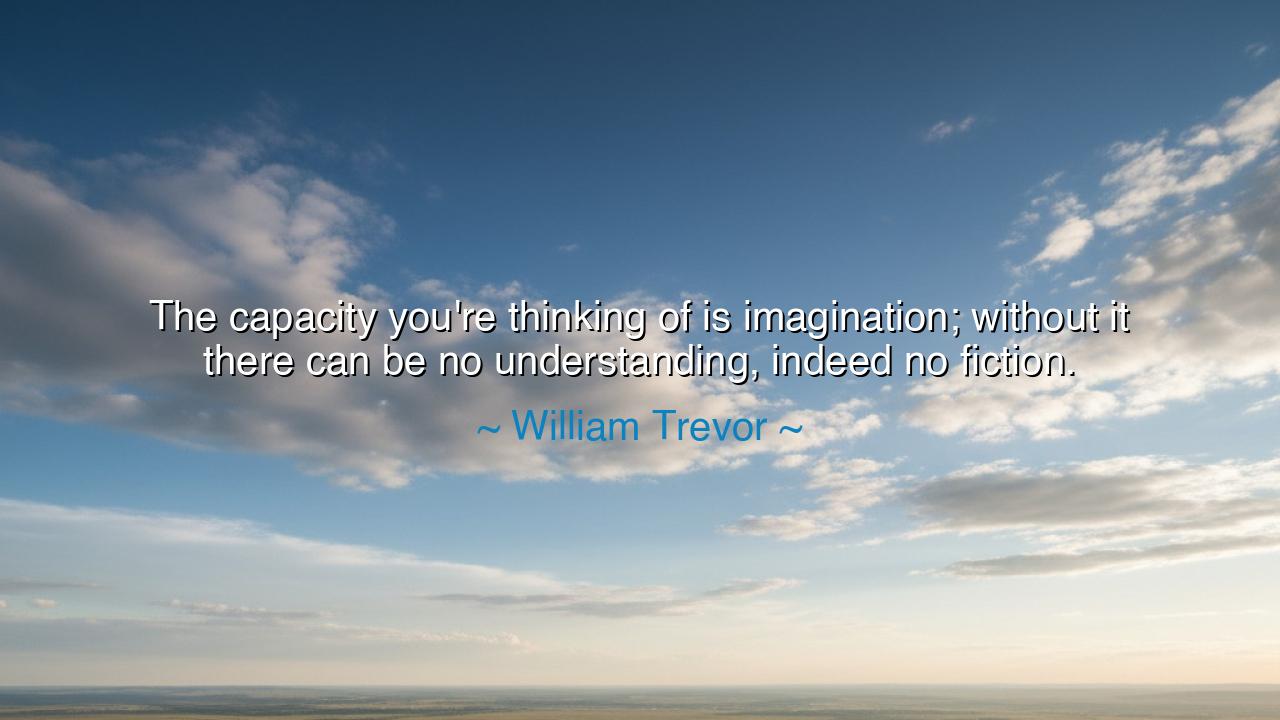
The capacity you're thinking of is imagination; without it there
The capacity you're thinking of is imagination; without it there can be no understanding, indeed no fiction.






“The capacity you're thinking of is imagination; without it there can be no understanding, indeed no fiction.” – William Trevor
In the beginning of all thought, before reason had learned to speak its name, there was imagination — the first fire that lit the cave of the human mind. William Trevor’s words echo across the ages like the voice of an elder reminding the tribe of its true inheritance. He does not speak of imagination as a luxury or a fleeting spark, but as the root of all understanding, the secret breath that animates every act of creation. Without it, man remains blind though his eyes are open, deaf though the wind carries the songs of truth. To understand is not to gather facts like dry leaves; it is to breathe life into them, to see what they mean, to weave them into the living tapestry of thought. That weaving is imagination.
Imagination is the bridge between what is and what could be. It is the unseen architect that builds the world twice — once in vision, then in stone. Long before the ship sails, it has already crossed the sea in the captain’s mind. The sculptor feels the curve of the marble before the first strike of the chisel. The saint, the philosopher, the poet — all drink from this same hidden spring. Without it, the heart withers in the desert of literalness. It is imagination that gives understanding its color, its compassion, its reach. For one cannot understand what one cannot imagine.
Consider the tale of Galileo Galilei, who, imprisoned by dogma, dared to imagine the heavens not as they appeared but as they truly are. When he looked through his humble telescope, he saw not merely lights, but worlds. His imagination broke the crystal sphere of medieval thought and opened the infinite expanse of the cosmos. His understanding was born not from rebellion, but from the sacred act of imagining — to see beyond what eyes alone reveal. And though the world condemned him, time has crowned him a seer of truth. His story reminds us that every act of genuine understanding begins with the courage to imagine differently.
Yet imagination is not the realm of artists and dreamers alone. Even the farmer, who looks upon a barren field and envisions green abundance, acts in the spirit of Trevor’s wisdom. The mother who comforts her child, the teacher who sees potential in a restless pupil — these are acts of imagination. They require the seeing of what is not yet, the comprehension of what lies beneath the surface. To understand another’s heart, one must first step into it, live its fears and longings as one’s own. That is imagination made holy — the imagination that builds compassion.
Fiction, too, as Trevor reminds us, cannot exist without imagination — for it is both mirror and prophecy. The storyteller’s gift is to hold up that mirror to life and whisper, “Behold yourself.” Through the worlds they create, writers grant us new eyes. They make us feel grief that is not ours, love that we have not yet lived, redemption we have not yet earned. Fiction, in its highest form, is a training ground for empathy, a rehearsal for understanding. It is not an escape from truth, but its most luminous approach.
And yet, beware the times when imagination fades from the human soul. When men cease to imagine, they cease to understand, and thus they divide. Wars are born from a failure to imagine the suffering of others; cruelty blooms in the soil of unimaginative hearts. To restore peace, one must rekindle this sacred power — the capacity to picture the world as seen through another’s eyes. Imagination is not a flight from reality; it is the deepest return to it, the vision that restores the wholeness of what the intellect alone dissects.
So let this be the lesson passed from elder to youth: nurture your imagination, for it is the root of wisdom. Read deeply, listen earnestly, dream boldly. When you encounter a stranger, imagine his burdens; when you face the unknown, imagine its promise. Do not dismiss fiction as idle fancy — it is the soul’s rehearsal for truth. And when understanding eludes you, do not reach harder for logic — reach further into imagination. There, in that sacred fire, you will find again the light of comprehension, and with it, the humanity that binds us all.
For in the end, William Trevor’s truth is eternal: without imagination, there can be no understanding, and without understanding, there can be no life worth living.






AAdministratorAdministrator
Welcome, honored guests. Please leave a comment, we will respond soon